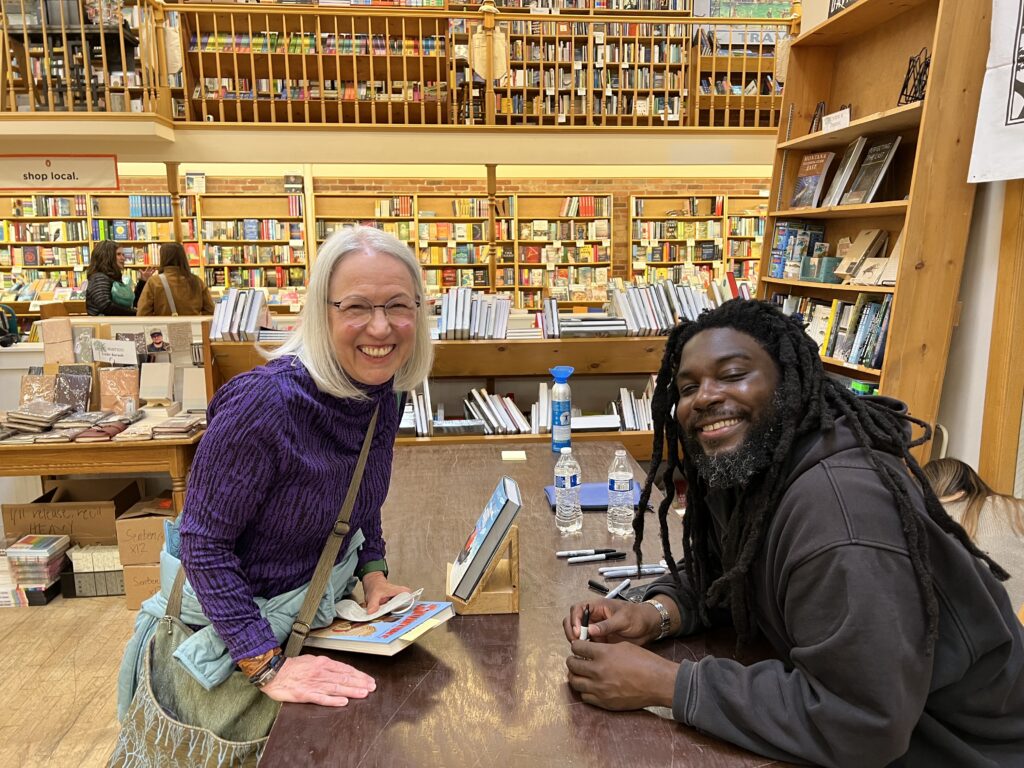Not long ago I had the fantastic opportunity to listen to and then meet Jason Reynolds. Jason is the current US National Ambassador for Young People’s Literature and he was in Bozeman as part of a tour in this capacity and heading out to small, rural schools, three of which he visited in Montana. He’s also an award-winning author of multiple books for young readers. Because it was a last-minute gathering at our hometown Country Bookshelf, the turnout was intimate.
Lucky me!
Jason Reynolds, Super-Guy
Jason is thoughtful and articulate, especially when it comes to kids and their difficulties, partly because he was a kid with difficulties. He admitted that he hated reading – until he was 17 (“and a half”). He credits his mother with just about everything, but also nods to a singular teacher/mentor who turned him onto books by introducing him to “not-boring” books.

Meeting Jason Reynolds was a thrill – hearing him speak was inspiring.
He also spoke passionately about the need for books to help kids through trauma. And yes, I believe that this is why I write, this is why we need books, this is what kids need.
Not long ago I wrote a post about “Writing Through Trauma”. I want to reiterate some of the points because here we are again, in a time of pain and sorrow.
Writers Addressing Difficult Subjects
I wrote CARRY ME HOME because the difficult topic of homelessness and my own feelings of helplessness wouldn’t let me alone. Chris Barton wrote ALL OF A SUDDEN AND FOREVER about the Oklahoma City Bombing to bring a feeling of hope to a traumatic event. Kevan Atteberry wrote GHOST CAT because he was dealing with personal loss and wanted to relate what he was feeling for kids.
You can find all of these books in my Bookshop here.
Jason Reynolds has written about racism, gang violence, and difficult childhoods because he understands that many kids need to be able to process these stories, stories that he knows only to well, in their own lives.
This is what writers do – we write to help ourselves process the traumas but also to give to readers an example of dealing with trauma. I call this “writing with empathy”.
Write With Empathy
Your writing is important. Readers need your words. Remember that what you reflect on the page can help someone process, and especially when you write for young readers you have an obligation to make your themes, your ideas, your subtext resonate with empathy and compassion.
I suggest that you do the following:
- Reflect on a personal experience. Use the emotions of that experience to fuel your stories.
- Do not shy away from difficult subjects, but treat them with care, especially when you write for kids.
- If you are an author with books on hand, join e.E. Charlton-Trujillo to donate books to the children of Uvalde, Texas.
And if you ever have the chance, go listen to Jason Reynolds.
P.S. – In the next couple of weeks I’ll be offering a giveaway. If you have bought a copy of CARRY ME HOME or pre-order the paperback edition (out August 16!) and let me know, I’ll send you a cool downloadable packet of goodies.
Yes! I bought or pre-ordered CARRY ME HOME! Send me goodies!
